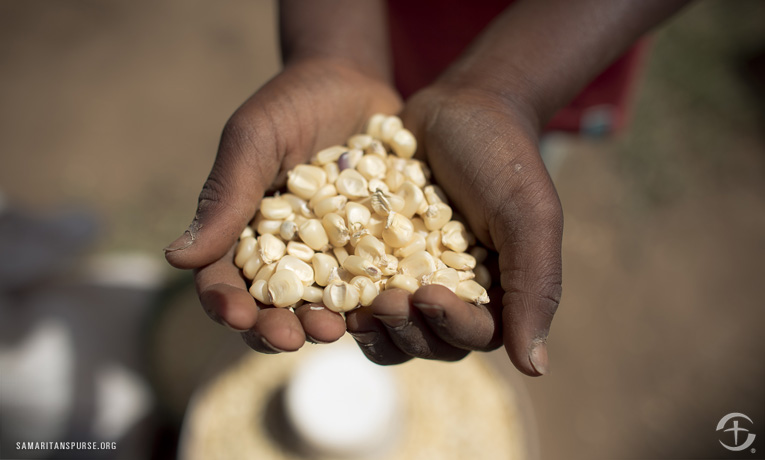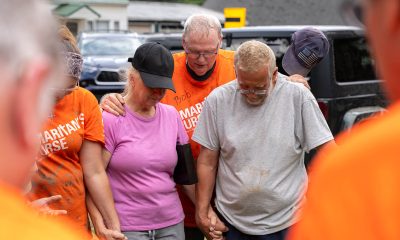After flooding in Mozambique, a woman lost her clothes, her food, her livelihood, her home, and even her baby. Samaritan's Purse worked in her community to give Lina and her neighbors food they desperately needed.
by Chelsea Pardue, a Samaritan’s Purse staff writer who traveled to Mozambique shortly after the flooding that happened in late January
At this point, it’s been five months since flooding hit Mozambique, destroying homes and leaving farmers with no crops and no animals. It’s been more than four months since I traveled there and returned home with what doctors believe was some form of typhus.
I was really sick for a long time, and in the midst of returning home from Mozambique only to turn around and travel to Minnesota while trying desperately to fight my hazy mind and weak body, some of my stories never made it into print. My notebooks sat filled with ink, and it wasn’t until much later that I looked back through them to find the untold stories.
These stories might not be timely, but they’re still important. Although most people forgot about the Mozambique flooding months ago (if they even heard about it at all), the people who were affected are still struggling.
Samaritan’s Purse has an office in Mozambique, and we’re still working to help the Gaza area recover from flooding. During the first stages of relief, we distributed food, water, blankets, hygiene kits, and other necessities. Now we’ve moved into recovery efforts to help people with long-term needs.
During our initial relief efforts, I mostly covered our work by going to food and supply distributions and meeting people who had been affected by the flooding. One day, I crammed into a small truck as we drove to a close by distribution. We set up our supplies underneath a large tree, the only place to hide from the scorching sun. Although it had flooded only a couple of weeks earlier, the ground was dry, and dust covered my feet and skirt.
As I contemplated whether it would be rude to chug my bottle of water in front of hundreds of people who hadn’t seen clear water in weeks, a woman in red approached me. “Hello, I’m Lina,” she said. Although I had an interpreter standing close by, she spoke enough English that I could understand her until she became flustered and began speaking in Portuguese.

After the flooding, Lina had to focus not only on keeping her family nourished, but she also had to find emergency healthcare for herself.
I asked Lina about what happened to her during the flooding, and the story chilled me even in the beating African sun. She was seven months pregnant when the floods came to Mozambique. She and her family fled from their home in terror as they saw the water lapping closer. As they ran, they heard it collapse behind them. Water quickly covered the nearby road, and as the family turned to run in another direction, Lina fell hard—face first—into the mud. She rose and continued, but raging water soon surrounded her and her family.
With nowhere left to seek refuge, the family climbed onto a neighbor’s roof. For five days, they sat first in the pounding rain and then in scorching sun, waiting for the water to recede.
As Life Got Worse
“Life was not that good before, and after the water, things got worse,” Lina said.
When her family finally climbed down from the roof, relief turned to desperation as they realized they had nothing. Floodwaters had carried off their home, clothes, cooking utensils, and food. Lina’s mother-in-law previously raised livestock for food and money, but the torrents drowned all her animals.
“I have a 2-year-old child,” Lina said. “She would wake up in the morning asking for bread, but I could not give her bread.”
Although Lina began trying to care for her family, she was growing concerned about her own health. She had started bleeding after her fall. Her health rapidly deteriorated until a neighbor realized Lina’s baby had died in the womb. That neighbor helped nurse Lina back from near death.
Since then, Lina’s family has been sleeping outside while they search for basic necessities. She started working piecemeal jobs to help pay for supplies to rebuild their home. When I spoke with her, she didn’t seem despaired. She occasionally laughed, but usually she spoke matter-of-factly with few facial expressions at all. It was almost as though she had grown numb to her situation.
Food distributions take much longer than I’d imagined. This one took nearly eight hours, so Lina and I had plenty of time to sit together as she told me her story. Although her face said little, she thanked me for the food distribution.

Samaritan’s Purse distributed beans, corn, cooking oil, and other food staples following the flooding.
“The food that helped me is this food that you guys are distributing,” she said.
I haven’t seen or heard about Lina since that day. I hope that she and her family have been able to rebuild their house and that she was able to find a stable job. Although food distributions are so busy and large that our staff doesn’t share an explicit Gospel message, we work with community leaders who help tell their communities why we do what we do. I hope that God comforted Lina as she and her family struggled, so that even if she was hungry, she could remember this verse: “My soul will be satisfied as with fat and rich food, and my mouth will praise you with joyful lips” (Psalm 63:5, ESV).

After the flooding, collecting food was mostly a task assigned to women. Several of them gathered together to receive a large bag to split among their families.
Although the flood is over, recovery will take years. As people still face the ramifications of losing everything and as our staff continues to help them, I have a few prayer requests.
- That Lina and her family would rely on God as they rebuild their lives.
- That long-term recovery efforts would reach families devastated by the flooding.
- That our staff in Mozambique will continue to effectively share the Gospel as we provide needed aid.






